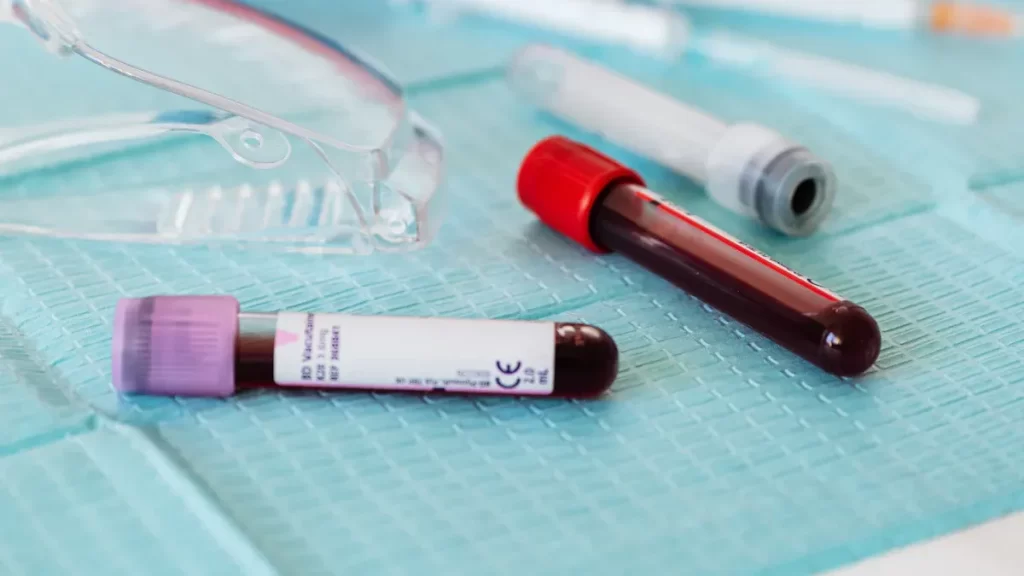News & Events
Everything You Need to Know About Hepatitis B Antibody Testing
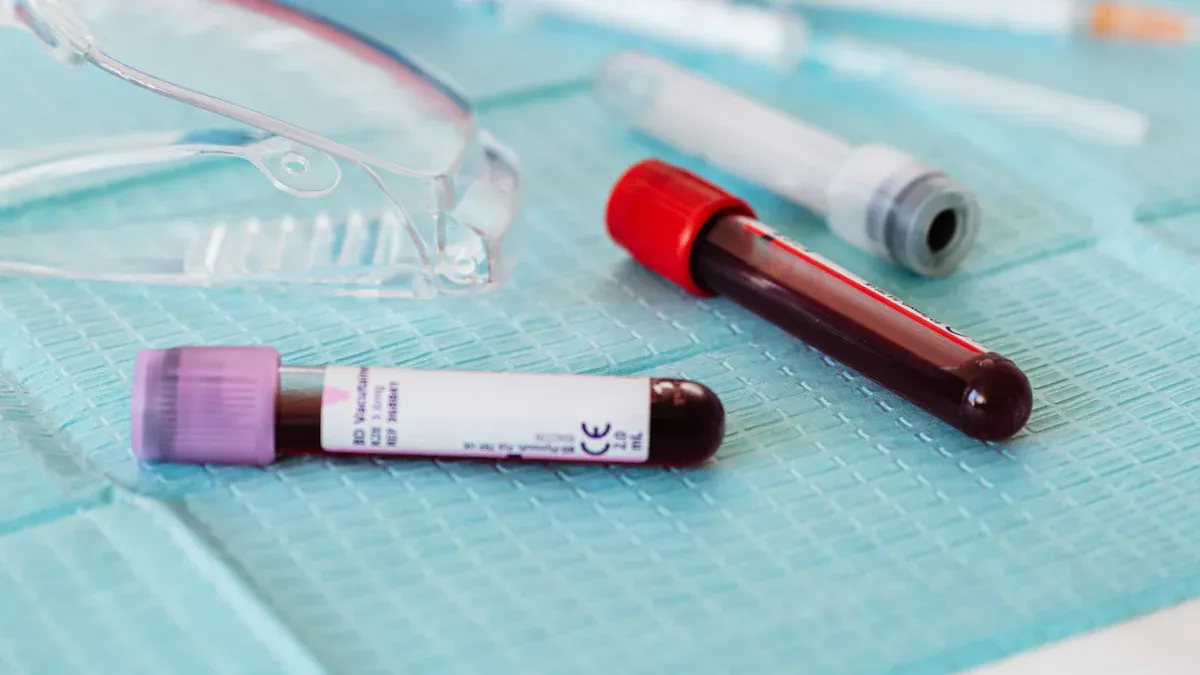
Hepatitis B antibody testing helps you find out if you have protection against hepatitis B or if you have been exposed to the virus. This test plays a key role in keeping you healthy because hepatitis B can lead to liver problems. The CDC recommends that all adults get screened at least once. Pregnant people should get tested early, and those at higher risk need regular checks.
- Worldwide, about 2 billion people have had hepatitis B.
- Nearly 300 million people are living with chronic hepatitis B.
- In the United States, more than 860,000 people have hepatitis B.
Understanding your hepatitis B blood tests makes it easier to know your next steps. With the right guidance, you can interpret your results and manage your health with confidence.
Key Takeaways
- Hepatitis B antibody testing is crucial for understanding your health and protecting your liver. Regular testing helps detect infections early.
- All adults should get screened for hepatitis B at least once. Pregnant individuals and those in high-risk groups need more frequent testing.
- Understanding your test results is key. Different markers indicate your infection status, immunity, or need for vaccination.
- If you test positive for hepatitis B, consult your healthcare provider for guidance on next steps and treatment options.
- Vaccination is essential for those at risk. It protects against both acute and chronic hepatitis B infections.
Who Should Get Hepatitis B Virus Testing
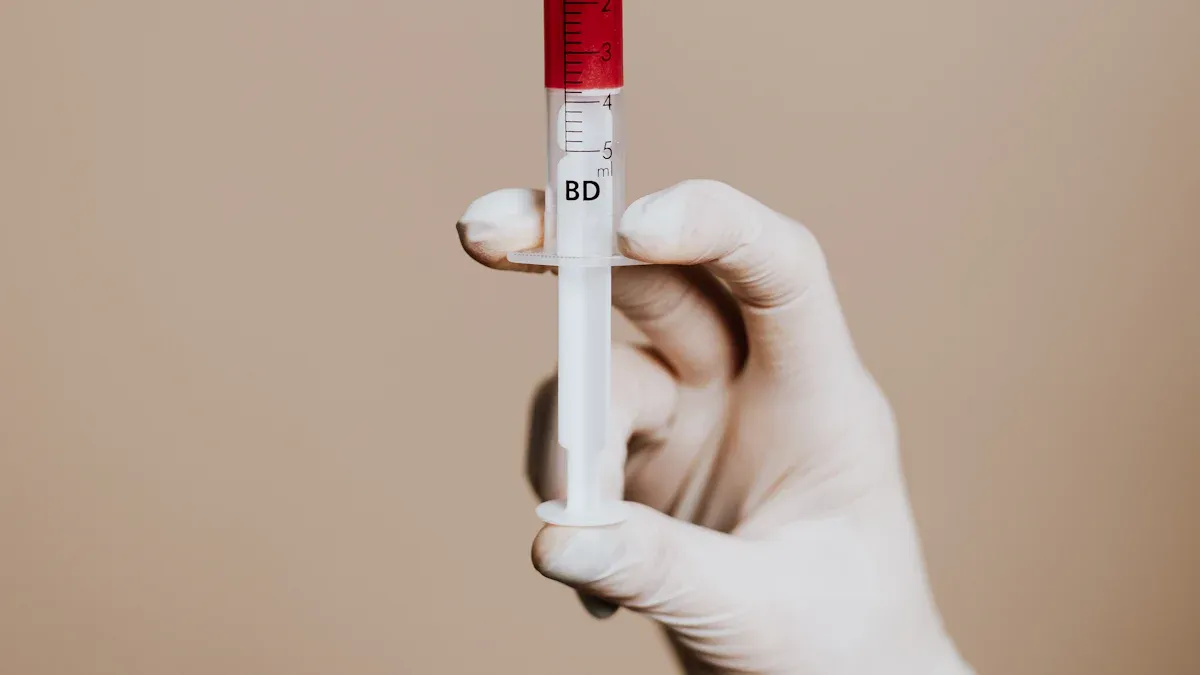
High-Risk Groups
You may need hepatitis B testing if you belong to a high-risk group. Some people have a greater chance of getting hepatitis B because of where they live, their job, or certain health conditions. The table below shows groups that face a higher risk:
| High-Risk Group |
|---|
| Migrants from endemic regions |
| Partners or family members of infected persons |
| Health-care workers |
| People who inject drugs (PWID) |
| People in prisons and other closed settings |
| Men who have sex with men (MSM) |
| Sex workers |
| Transgender people |
| People living with HIV |
| Patients completing chemotherapy |
| Patients taking immunosuppressive therapy |
| Patients with HIV who have discontinued therapy |
| Patients undergoing organ or bone marrow transplant |
| Patients getting treatment for hepatitis C virus (HCV) infection |
If you belong to any of these groups, you should consider hepatitis B virus testing. You can protect your health and the health of those around you by knowing your status.
Routine Screening
The CDC recommends that all adults get hepatitis B testing at least once in their lifetime. This approach helps find people with hepatitis B who may not know they have it. The CDC also suggests a triple-panel test. This test checks for hepatitis B surface antigen, antibodies to the surface antigen, and total hepatitis B core antibody. Adults aged 19 to 59 should also get vaccinated if they have not done so already. Routine screening helps prevent chronic hepatitis and reduces the risk of liver disease.
When to Test
You should get hepatitis B testing if you have certain risk factors or situations. Here are some common reasons to get tested:
- You use injection drugs.
- You have multiple sex partners.
- You had accidental needle sticks.
- You had surgery or a blood transfusion.
- You live with someone who has hepatitis B.
- You are a health care worker or emergency responder.
- You were born in a region where hepatitis B is common.
- You are pregnant.
Screening recommendations also depend on your background and health status. For example, people born in countries with high hepatitis B rates should get tested, even if they had the vaccine. The table below shows more details:
| Risk Group | Screening Recommendation |
|---|---|
| Persons born in countries with HBsAg prevalence of 2% or greater | Screen regardless of vaccination history |
| US-born persons not vaccinated as infants with parents from regions with HBsAg prevalence of 8% or greater | Screen |
| Persons who inject drugs | Screen |
| Men who have sex with men | Screen |
| Persons with HIV infection | Screen |
| Persons with hepatitis C virus infection | Screen |
| Inmates of correctional facilities | Screen |
| Household contacts and sexual partners of HBsAg-positive persons | Screen |
Tip: If you are unsure about your risk, ask your doctor about hepatitis B testing. Early detection can help you stay healthy and prevent the spread of hepatitis.
Hepatitis B Antibody and Antigen Markers
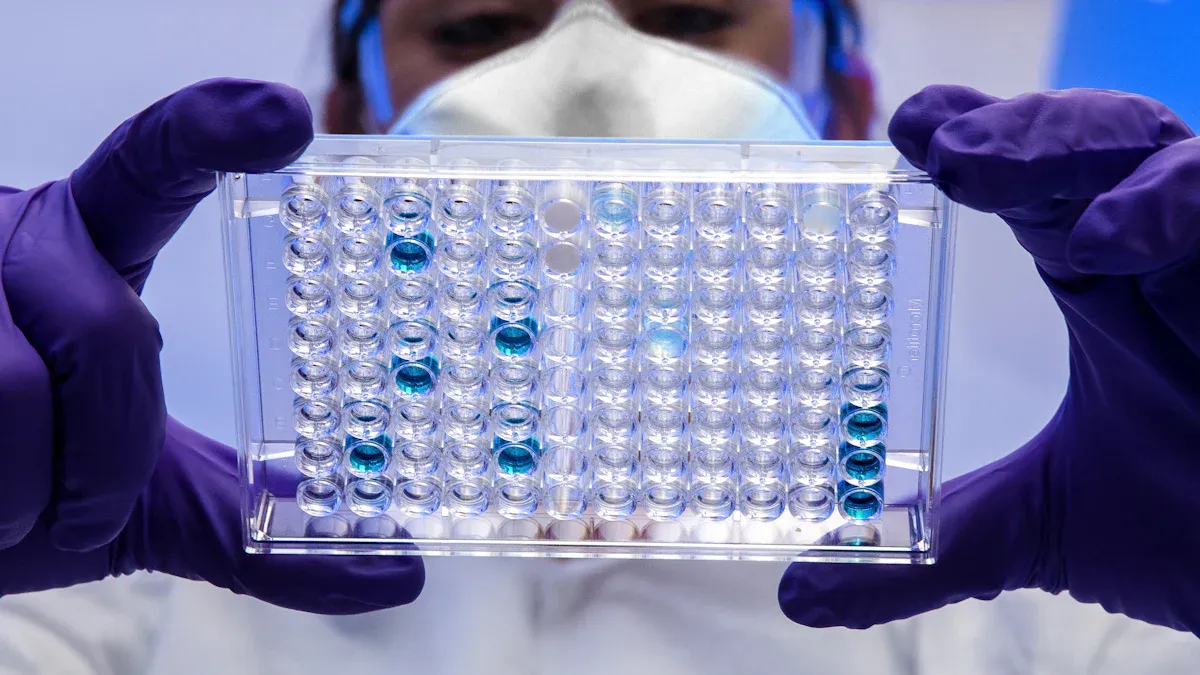
Understanding hepatitis B antibody and antigen markers helps you know your infection status and immunity. These markers show if you have an active infection, past exposure, or protection from hepatitis B. You can see the main markers and what they mean in the table below:
| Marker | Description |
|---|---|
| HBsAg | Shows active hepatitis B virus infection. Appears early in acute hepatitis B infection. Usually disappears within 15 weeks if you recover. |
| anti-HBs | Also called hepatitis B surface antibody. Shows recovery and immunity. Appears after HBsAg disappears. |
| HBcAb (anti-HBc) | Stays positive for life after hepatitis B exposure. Shows past infection. |
| HBeAg | Appears in new acute infections. Means higher virus levels and higher risk of spreading hepatitis B. |
| IgM anti-HBc | Shows a new acute hepatitis B infection. Usually declines within 6 to 9 months. |
| IgG anti-HBc | Stays positive for life after exposure. Shows past infection or immunity. |
| HBcAg | Found in the core of the virus. Shows the virus is actively replicating in the liver. |
HBsAg
HBsAg stands for hepatitis B surface antigen. If you test positive for HBsAg, you have an active hepatitis B infection. This marker appears early in acute hepatitis B infection. Most people who recover lose HBsAg within 15 weeks. Sometimes, HBsAg can be hard to detect if there are mutations. Some people may still have hepatitis B even if this marker is negative.
Anti-HBs
Anti-HBs is also called hepatitis B surface antibody. If you have this antibody, you are immune to hepatitis B. You can get this immunity from a past infection or from the hepatitis B vaccine. A positive hepatitis B surface antibody test means you are protected from future hepatitis B virus infection.
Tip: If your anti-HBs is positive, you do not need the hepatitis B vaccine.
Anti-HBc
Anti-HBc is another important hepatitis B antibody. This marker stays positive for life after you have been exposed to hepatitis B. A positive anti-HBc test can mean you had a past infection, a recent acute infection, or sometimes a false positive. Doctors may repeat the test to confirm the result. In children, anti-HBc can come from their mothers.
HBcrAg
HBcrAg stands for hepatitis B core-related antigen. This marker helps doctors check how active the virus is in your liver. HBcrAg is a non-invasive way to measure viral replication. It can help predict the risk of liver cancer and if the infection might return after treatment. Doctors use this marker with caution because it does not always match other test results.
IgM vs IgG Anti-HBc
Your body makes two types of hepatitis B antibody to the core antigen: IgM and IgG. IgM anti-HBc shows a new acute hepatitis B infection. It usually goes away after 6 to 9 months. IgG anti-HBc stays positive for life and shows you had a past infection or have immunity.
What is the difference between antigens and antibodies?
- Antigens show the presence of the hepatitis B virus and its activity in your body.
- Antibodies are made by your immune system to fight the virus. The presence of hepatitis B antibody means your body has responded to the infection or vaccine.
These markers of hepatitis B virus infection help you and your doctor understand your health and guide your next steps.
Interpreting Test Results
Understanding your hepatitis b blood tests helps you know your hepatitis b status and what steps to take next. Interpreting test results can seem confusing, but you can use simple patterns to find out if you have a new acute infection, chronic infection, immunity, or if you are still at risk.
Result Combinations
You will often see several markers in your hepatitis b blood tests. These markers include HBsAg, anti-HBc, anti-HBs, and sometimes IgM anti-HBc. Each combination tells you something different about your infection status. The table below shows the most common test result combinations and what they mean:
| Test Results Combination | Clinical Interpretation |
|---|---|
| HBsAg negative, Anti-HBc negative, Anti-HBs negative | Susceptible to hepatitis b; vaccination recommended. |
| HBsAg negative, IgG anti-HBc positive, Anti-HBs positive | Immune due to natural infection; no current viral antigen. |
| HBsAg negative, Anti-HBc negative, Anti-HBs positive | Immune due to vaccination; good outcome post-immunization. |
| HBsAg positive, IgG anti-HBc positive, IgM anti-HBc positive, Anti-HBs negative | Probably acutely infected; early immune response present. |
| HBsAg positive, IgG anti-HBc positive, IgM anti-HBc negative, Anti-HBs negative | Probably chronically infected; ongoing viral presence. |
| HBsAg negative, IgG anti-HBc positive, Anti-HBs negative | Possible resolved infection; not immune; vaccination may be advised. |
You can also use the following table to match your blood test result with its meaning:
| HBsAg | Anti-HBc | Anti-HBs | IgM anti-HBc | Interpretation |
|---|---|---|---|---|
| Negative | Negative | Negative | Not tested | Clear of infection but susceptible, requires vaccination to protect |
| Negative | Positive | Positive | Not tested | Immune due to successful recovery from past infection |
| Negative | Negative | Positive | Not tested | Immune due to HBV vaccination |
| Positive | Positive | Negative | Positive | Acute infection that occurred within the previous 6 months |
| Positive | Positive | Negative | Negative | Chronic infection, which may be positive or negative for HBeAg |
| Negative | Positive | Negative | Not tested | Multiple possibilities: resolved infection, false-positive anti-HBc, false-negative HBsAg or anti-HBs, low-level chronic infection, resolving acute infection |
Tip: If your test results show you are susceptible, you should get the hepatitis b vaccine to protect yourself.
What Results Mean
You can use your hepatitis b blood tests to find out if you have a new acute infection, chronic infection, or if you are immune. Here is a simple guide to help you understand what your results mean:
-
Susceptible to hepatitis b
- HBsAg negative, anti-HBc negative, anti-HBs negative
- You have never had hepatitis b virus infection or the vaccine. You need vaccination to protect yourself.
-
Immune due to natural infection
- HBsAg negative, anti-HBc positive, anti-HBs positive
- You had a past infection and recovered. Your body made antibodies. You do not need the vaccine.
-
Immune due to vaccination
- HBsAg negative, anti-HBc negative, anti-HBs positive
- You received the hepatitis b vaccine. You are protected.
-
New acute infection
- HBsAg positive, anti-HBc positive, IgM anti-HBc positive, anti-HBs negative
- You have a new acute infection. Your body is fighting the virus. You may feel sick, and you can spread the infection to others.
-
Chronic infection
- HBsAg positive, anti-HBc positive, IgM anti-HBc negative, anti-HBs negative
- You have a chronic infection. The virus has stayed in your body for more than six months. You need regular check-ups to protect your liver.
-
Possible resolved infection or other possibilities
- HBsAg negative, anti-HBc positive, anti-HBs negative
- You may have had a past infection and cleared it, but you do not have enough antibodies. Sometimes this pattern means a false-positive test or a low-level chronic infection. Your doctor may recommend more testing.
Note: A positive result meaning you have hepatitis b infection can be acute or chronic. A negative result meaning you do not have infection may still mean you need vaccination.
The chart below shows how often certain markers appear in people with hepatitis b infection compared to those without:
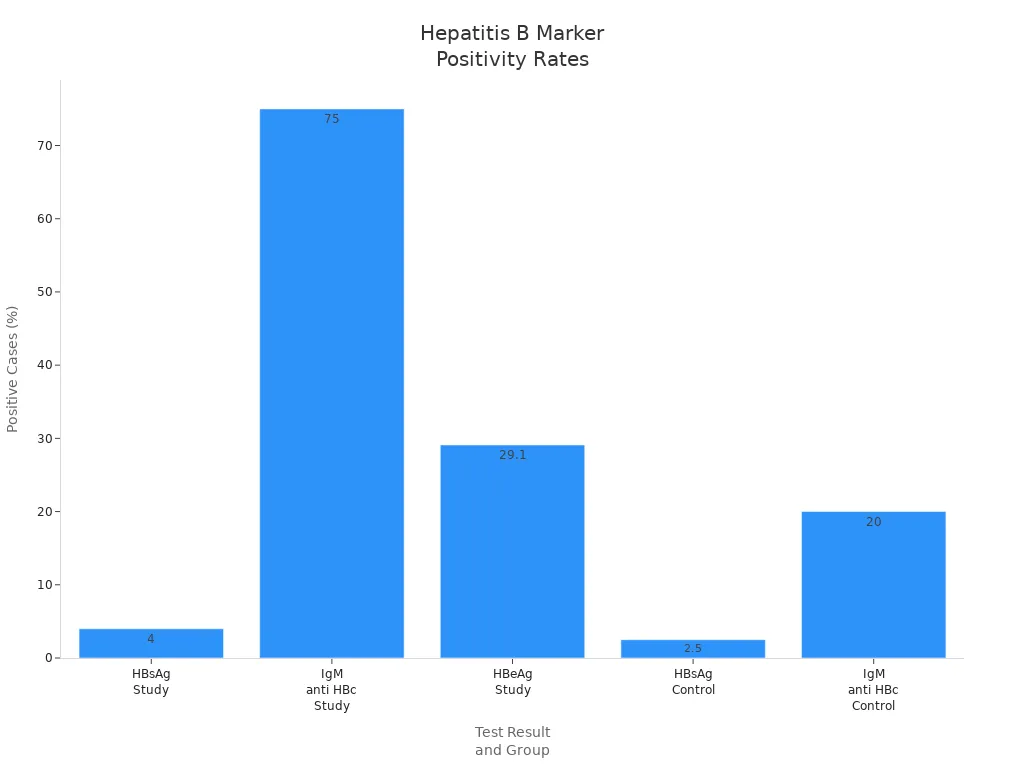
You can see that HBsAg and IgM anti-HBc are much more common in people with active infection. If you have a new acute infection, you will likely see both HBsAg and IgM anti-HBc positive in your blood test result. Chronic infection usually shows HBsAg positive and IgM anti-HBc negative.
If you have questions about your hepatitis b status, always talk to your doctor. Interpreting test results helps you know if you need treatment, more testing, or vaccination.
Next Steps After Hepatitis B Blood Tests
Medical Advice
After you receive your hepatitis b blood test results, you should talk to your healthcare provider. Your doctor can explain what your results mean and help you decide what to do next. If your results seem confusing, you should ask for clarification. You may need more testing if your results do not match your symptoms or medical history.
If you have questions about your hepatitis b status, contact your provider. They can guide you through your next steps and answer any concerns.
You should seek medical advice if:
- Your hepatitis b virus infection status is unclear.
- You have symptoms of hepatitis, such as yellow skin or eyes, fatigue, or stomach pain.
- You belong to a high-risk group and have not received the hepatitis b vaccine.
Follow-Up Care
Follow-up care helps you stay healthy after hepatitis b virus infection or exposure. Your provider will check your health during regular visits. They may order blood tests or imaging to monitor your liver. If you had surgery or a liver transplant, you need imaging and blood tests every 3 to 6 months for the first 2 years, then every 6 to 12 months. You should tell your doctor about any side effects or new symptoms. Keeping health insurance helps you get ongoing care.
Steps for follow-up care:
- Clean the area with soap and water if you had exposure.
- Check your hepatitis b vaccine status.
- If you did not respond to the hepatitis b vaccine, your provider may give you HBIG (hepatitis B immune globulin).
- Attend all follow-up appointments for exams and tests.
Treatment Options
Treatment for hepatitis b depends on your test results and health. For acute hepatitis b, you may need supportive care, such as rest, a balanced diet, and fluids. Most people recover without medication. For chronic hepatitis b, your doctor may check your HBV DNA and ALT levels. If your HBV DNA is high and ALT stays elevated for 3 to 6 months, you may need antiviral therapy. Doctors use medicines like pegylated interferon, entecavir, or tenofovir disoproxil fumarate. Pregnant patients with high HBV DNA levels should get antiviral therapy to protect their baby. Your provider will monitor your liver and viral load regularly.
| Treatment Type | Description |
|---|---|
| Supportive Care | Rest, balanced diet, and hydration for acute cases. Hospitalization is individualized. |
| Antiviral Medications | Used for chronic hepatitis b. Not all patients need medication. Side effects may occur. |
| Prophylaxis for Exposure | Hepatitis b vaccine and HBIG for postexposure prophylaxis. |
| Treatment for Pregnant Patients | Antiviral therapy for high HBV DNA levels to reduce transmission risk. |
| Monitoring for Coinfected Patients | Testing for HBV in patients starting HCV treatment. Consider antiviral treatment if HBV is present. |
| Recommended Agents | Pegylated interferon, entecavir, and tenofovir disoproxil fumarate are FDA-approved treatments. |
Vaccination
Vaccination protects you from hepatitis b virus infection. If your test shows you are susceptible, you should get the hepatitis b vaccine. The CDC recommends vaccination for all adults who have not received it. Infants born to parents with hepatitis b should get post-vaccination serologic testing to check for immunity. The hepatitis b vaccine is safe and effective. You need all recommended doses for full protection.
Tip: The hepatitis b vaccine helps prevent both acute and chronic hepatitis b. Ask your provider about your vaccination status and schedule.
Clinical Significance of Hepatitis B Antibody Testing
Liver Health
You protect your liver when you get timely hepatitis b antibody testing. This test helps you and your doctor understand your immune response and the state of inflammation in your body. People who have hepatitis b surface antibodies often show better immune control. Their liver works better, and they have less inflammation. If you do not have these antibodies, you may face more inflammation. This can lead to liver fibrosis or even liver cancer over time.
- Timely testing influences your immune system and helps reduce inflammation.
- People with positive hepatitis b antibodies usually have healthier livers.
- Without antibodies, you risk more inflammation, which can cause serious liver problems.
Chronic hepatitis b infection is a major risk factor for liver cirrhosis and hepatocellular carcinoma. Early detection and intervention slow down disease progression and help protect your liver.
| Key Findings | Description |
|---|---|
| Chronic HBV infection | A significant risk factor for liver cirrhosis (LC) and hepatocellular carcinoma (HCC). |
| Importance of early prediction | Early intervention is essential to slow disease progression and protect liver function. |
| Clinical characteristics | Doctors analyze patients with hepatitis b-related LC and HCC at different ALT levels. |
Preventing Transmission
Hepatitis b antibody testing plays a key role in stopping the spread of hepatitis. You help protect others when you know your status. Pregnant women should get tested in the first trimester. This helps doctors plan the best care for both mother and baby. Newborns of mothers who test positive for hepatitis b surface antigen need testing after vaccination. If their antibody levels are low, extra vaccine doses can boost their protection.
| Evidence Type | Description |
|---|---|
| Testing Pregnant Women | All pregnant women should be tested early to guide care and immunoprophylaxis for newborns. |
| Newborn Testing | Babies born to positive mothers need testing after vaccination to check for protection. |
| Immunoprophylaxis | Low antibody levels mean more vaccine doses are needed to prevent hepatitis b transmission. |
Long-Term Considerations
Chronic hepatitis b often seems silent, but it can have a big impact on your life. You need regular check-ups to watch for virus activity, cirrhosis, or liver cancer. Doctors recommend seeing a specialist at least once or twice a year. Older adults face higher risks of liver cancer and death from liver disease, especially if untreated. At five years, about 6.5% of people with chronic hepatitis b develop liver cancer. This number rises to 15.6% at ten years.
- Regular monitoring helps catch problems early.
- You should see a hepatologist or gastroenterologist for proper care.
- Treatment decisions depend on your test results and ongoing monitoring.
Understanding the significance of hepatitis b antibody testing helps you take control of your health and future.
Hepatitis B antibody testing helps you understand your health and protect others. Many people do not know their infection status, which can lead to serious liver problems and ongoing transmission. You should talk to your healthcare provider about your results and follow CDC guidelines for testing and vaccination.
- Early testing and clear results help prevent liver disease and stop the spread of hepatitis B.
- Simple steps like avoiding alcohol, keeping a healthy weight, and regular check-ups support your liver health.
Taking action now gives you the best chance for a healthy future.
FAQ
What does a positive hepatitis B surface antibody mean?
A positive hepatitis B surface antibody means you have protection against hepatitis B. You either recovered from a past infection or received the vaccine. You do not need another vaccine if your anti-HBs is positive.
Can you get hepatitis B again after recovery or vaccination?
You usually stay protected after recovery or full vaccination. Your body keeps making antibodies. Rarely, people with weak immune systems may lose protection. Ask your doctor if you need a booster.
How soon should you get tested after possible exposure?
You should get tested as soon as possible after exposure. Some markers appear within 1 to 9 weeks. Your doctor may repeat tests after a few months to confirm your status.
Do you need to fast before a hepatitis B blood test?
You do not need to fast before a hepatitis B blood test. You can eat and drink normally. The test checks for antibodies and antigens, not blood sugar or cholesterol.
Is hepatitis B antibody testing covered by insurance?
Most health insurance plans cover hepatitis B testing, especially if you belong to a high-risk group or need routine screening. Check with your provider for details about your coverage.

